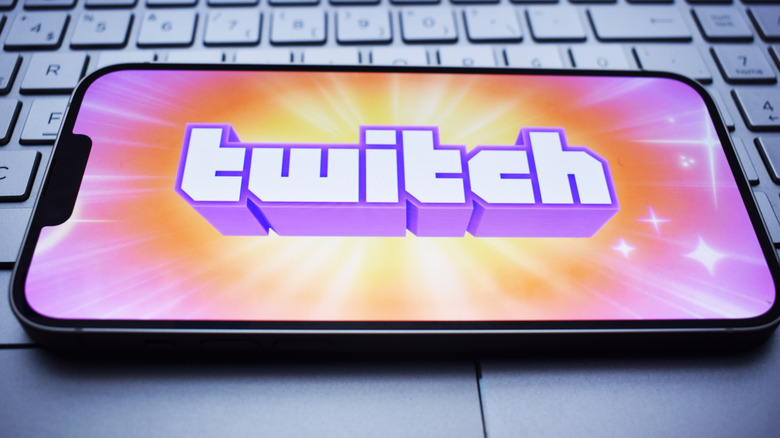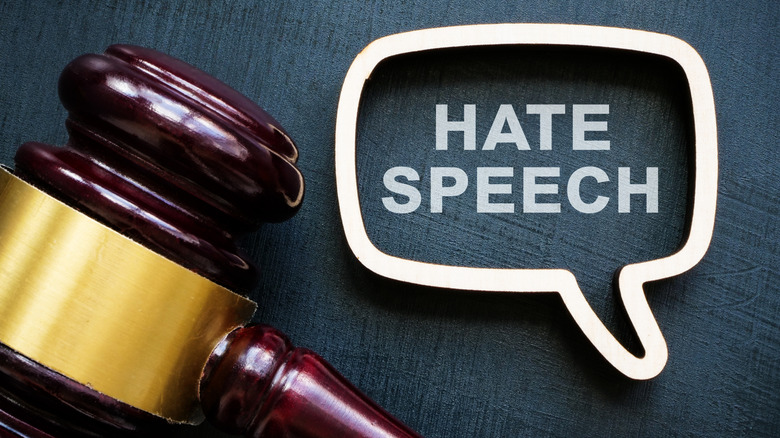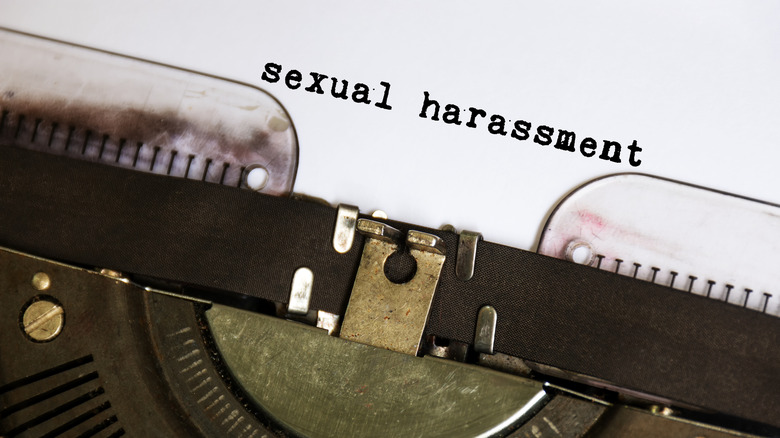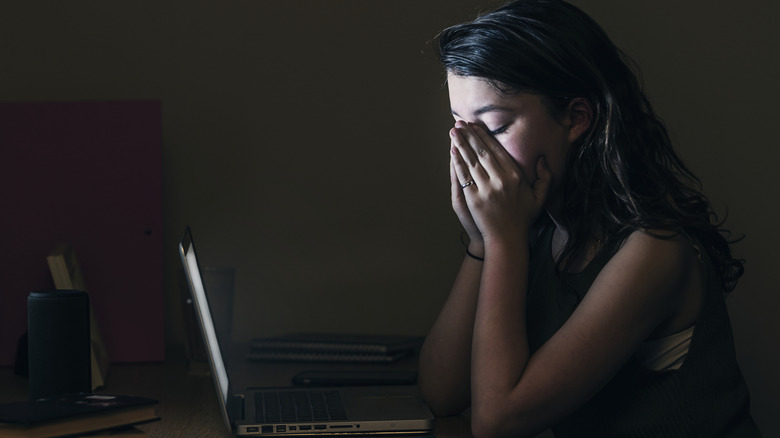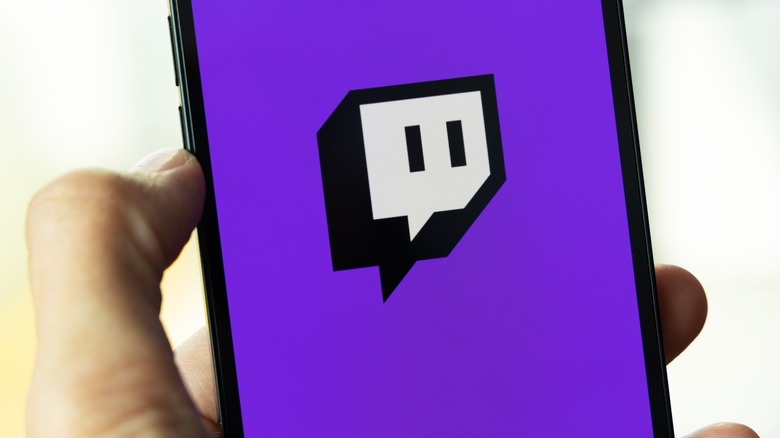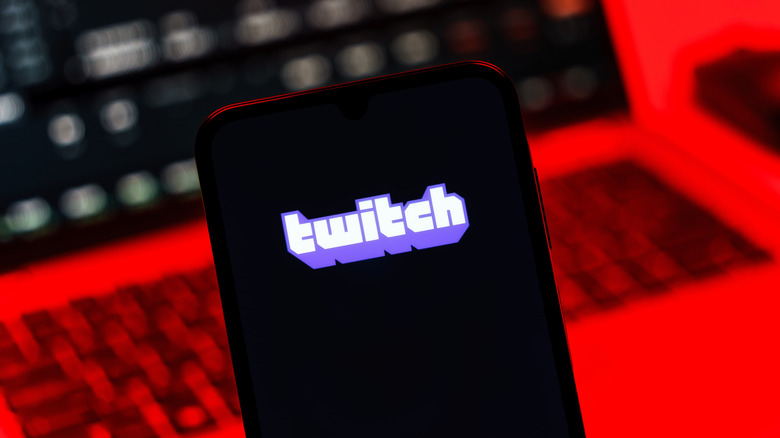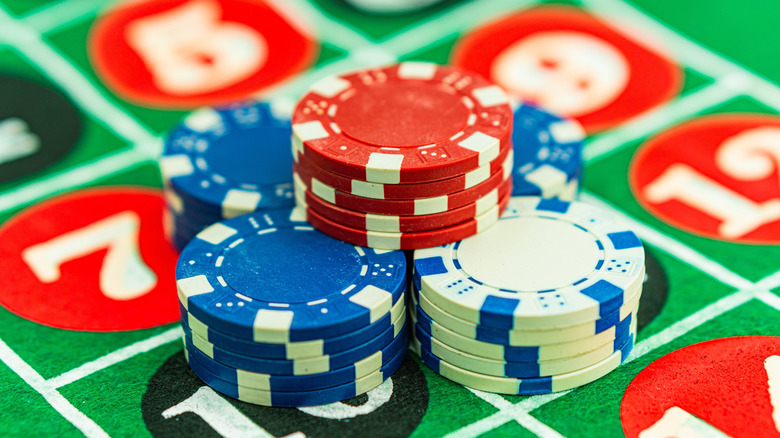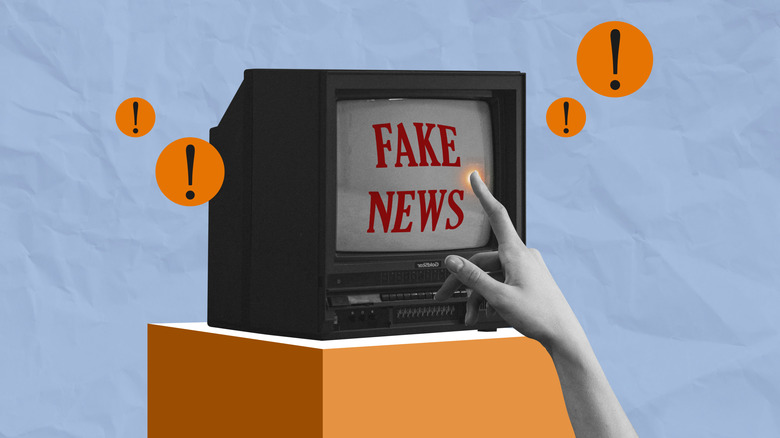10 Things That Can Get You Banned On Twitch
Though sometimes arduous to navigate, community guidelines are a necessary part of internet life. Whereas traditional video platforms like YouTube have the luxury of looking over pre-recorded content to assess violations, anything can happen on a live video platform like Twitch, where streamers can make big bucks off of live video content. By the time someone has broken the rules, tens of thousands of viewers may have been exposed to the violating content. And remember, Twitch is owned by Amazon, which has a brand image to maintain.
With that in mind, Twitch maintains strict Community Guidelines to prohibit the worst sorts of behavior, and violating them can easily get you banned from the platform, if not reported to the police or other law enforcement agencies. These rules apply not only to streamers but to viewers as well. Even if you don't stream on the platform, it's worth knowing what you can and cannot do as you enjoy your favorite creators' VOD content.
Hateful behavior won't fly on Twitch
One of Twitch's most robust community guidelines is its ban on hateful conduct against protected groups. Twitch protects characteristics of "race, ethnicity, color, caste, national origin, immigration status, religion, sex, gender, gender identity, sexual orientation, disability, serious medical condition, and veteran status," as well as age. Of course, it goes both ways; for example, you cannot direct hate toward someone on the basis of being a veteran, but you also can't do so on the basis that they are not a veteran.
Twitch considers hateful conduct to encompass the promotion, glorification, threatening, or advocacy of "violence, physical harm, or death against individual(s) or groups" on the basis of a protected characteristic. For example, you cannot say hateful slurs, encourage people to commit suicide (including through acronyms such as "kys"), or generally wish harm upon people based on their identity. It is also forbidden to modify video games to express hate, such as broadcasting a video game modded to add swastikas or other hate symbols into the gameplay. However, this would not necessarily apply to streaming a game like "Wolfenstein II: The New Colossus," which contains a high number of swastikas throughout the default version of the game without any modifications applied.
The rules applies to even its most popular streamers. Twitch banned Donald Trump for hateful conduct in 2020. In October 2024, Zach Hoyt, who streams under the alias Asmongold, was suspended from the platform after making derogatory remarks about Palestinian culture. And near the time of the 2020 Black Lives Matter protests, which erupted in the wake of George Floyd's extrajudicial murder by police, political streamer Destiny was permanently banned after wishing harm against protestors.
Sexual harassment will get you banned on Twitch
Sexually harassing people is against the Twitch Community Guidelines and will not only result in a ban but may get you reported to law enforcement. Sexual harassment is a crime, and Twitch takes the use of its platform to commit or facilitate crimes extremely seriously. There are a range of behaviors that constitute sexual harassment on Twitch, some of which may not be obvious to everyone. These include: "unwanted comments" about someone's "appearance or body," even if you use emojis, "sexual requests or advancements," "sexual objectification," and making "negative statements or attacks" about someone's "perceived sexual behaviors or activities" no matter their gender. Lastly, "recording or sharing" videos or images of an intimate nature without the consent of all parties depicted is not only against Twitch's rules but is also a crime in 48 states and the District of Columbia. This is known as revenge porn, and it carries heavy penalties in most states, including jail time.
Keep in mind that these rules —as with all of Twitch's Community Guidelines —apply equally to viewers and streamers. It is equally prohibited for viewers to harass streamers, whether by chat or other means, as it is for the streamers to harass viewers or other streamers. You can find a non-exhaustive list of examples of prohibited behavior here, but be aware that it contains somewhat detailed descriptions of sexual harassment. Sexual violence is also prohibited, and depicting, promoting, or engaging in non-consensual or coercive sex acts will result in immediate suspension.
Twitch is cracking down on sexual harassment, especially in chats. New features were introduced to the AutoMod moderation tool in July of 2024 that make it easier to filter out messages and report them. Additionally, the language of the sexual harassment policy was updated for clarity.
If you or anyone you know has been a victim of sexual assault, help is available. Visit the Rape, Abuse & Incest National Network website or contact RAINN's National Helpline at 1-800-656-HOPE (4673).
General harassment will also get your Twitch account banned
General harassment is expressly forbidden on Twitch, and could get your account suspended or banned. Harassment can take many different forms, from promoting physical harm against a person or group to lobbing personal attacks. This could look like telling someone to harm themselves, saying someone deserves to suffer or die, or making threats against them, even if the threat is only implied, in addition to directing one's viewers to harm someone. Twitch also considers the dispersion of doctored or deepfake depictions of a person harassment if those images or videos are designed to insult, degrade, or abuse.
Also included under harassment is brigading, hostile raiding, doxxing, and even stream sniping. Brigading is when a coordinated online attack is directed against someone, commonly referred to as "dogpiling." Hostile raiding refers to the practice of directing one's viewers to tune into another creator's stream to harass them (non-hostile raids are allowed). Doxxing refers to revealing information. Stream sniping is when someone watches another gamer's live stream in order to gain an unfair advantage against them, such as checking where they are on a PvP map to continually kill them in-game.
In addition to not engaging in harassment, streamers are expected to moderate their content and chat rooms to prevent harassment by their viewers. This closes a loophole where a creator might insinuate to their viewers that someone should be harassed, remaining inactive as that harassment is carried out on their behalf. Additionally, Twitch may take action for harassment that occurs off Twitch. However, if streamers use moderation tools and are seen to be actively removing abuse, they will generally not be penalized for the bad behavior of third parties.
Don't commit crimes while you're live on Twitch
One of the easiest ways to get banned from Twitch is to break the law live on stream. Twitch could get in a lot of trouble if streamers are caught breaking their local laws on its platform, depending on the country and law, so it will not hesitate to ban you for breaking the laws of your locale. Specifically, Twitch requires users to "respect all applicable local, national, and international laws" when using its services.
Not only will you get banned for breaking the law while streaming on Twitch, but you might also get reported to the relevant law enforcement authority. Twitch will have video evidence of your crimes to send along with their report, so committing crimes on a Twitch stream is one of the most surefire ways to end up getting convicted if you are indeed charged for those offenses.
While it might seem intuitive not to break the law on camera, Twitch's community guidelines extend further. Users are also prohibited from encouraging illegal activity, offering illegal activity such as black market products or services, or soliciting illegal activity. Let's use the example of illegal drugs, including marijuana in locales that have legalized it for recreational use. In addition to a prohibition on consuming such drugs, you also cannot sell them, attempt to buy them, or encourage others to engage in any of those behaviors.
Don't use Twitch to infringe on intellectual property
Twitch takes violations of copyright law or other intellectual property rights infringement extremely seriously; simply put, don't stream content you don't have the rights to. Unlike a lot of other Twitch community guidelines, the prohibition against infringing on intellectual property is easy for the platform to enforce. The streaming site uses a third-party automated service that scans streams for copyrighted content by matching video and audio against a database. Think of it like Shazam but for IP infringement. If Twitch detects an IP infringement violation, it typically mutes that portion of the stream and sends the streamer a warning. However, if an official DMCA claim is lodged by the rightsholder, Twitch will issue a strike on the account. After too many strikes, your account will be banned entirely.
You may wonder how music reaction channels or DJs are allowed to play music on Twitch in light of these rules. In recent years, some media companies have begun to recognize the value of having their IP spread on live streams. Major record labels have signed deals specifically aimed at protecting DJs who mix music for listeners. There's also a carveout in United States copyright law for fair use when copyrighted media is used in a transformative fashion, such as when reaction videos from streamers helped boost the popularity of tracks such as Drake's "Family Matters" and Lamar's Grammy-winning "Not Like Us" during their massive feud.
Nudity is a no-no, and too much booty will get you banned
Determining rules around sexual conduct and nudity is one of the finest lines Twitch's moderation team walks when setting community guidelines. Of course, pornography and other adult content is strictly off limits, but what exactly constitutes such content is a question that has even stymied the United States Supreme Court. As Justice Potter Stewart infamously said during a 1964 case, "I know it when I see it." But Twitch cannot function like a court. It needs rules that can be applied across the board without gray areas. So, while some content that clearly appeals to the prurient interest, such as so-called "hot tub streams," are allowed on the platform, it draws the line at "exposed anuses or fully unclothed and exposed buttocks." Also banned are "any amount of exposed genitals" and "female presenting individuals breasts with exposed nipples (unless actively breastfeeding a child)."
Notably, there are carve-outs for "art, history, educational content, or public art that might feature nude figures." However, the guidelines make clear that "fictional nudity" is also off-limits. That nude study you drew in art class? Twitch doesn't think it's artistic enough to show off on a stream. A carve-out is also made for body art, but female-presenting people must use "non-transparent clothing or a paint & latex combination" to obscure nipples before starting the stream, in addition to keeping genitals covered. Censored or implied nudity is also prohibited, meaning you can't go nude even if you blur or place black bars over your genitals. Overly tight clothing could trigger a ban, too, as Twitch doesn't allow "the visible outline of genitals, even when covered."
Sexual content is never okay on Twitch
As you might suspect, Twitch does not allow "broadcasting, uploading, soliciting, promoting, offering, and linking to pornographic content." As noted above, the definition of pornography can be an elusive one, so Twitch is clear to clarify this rule further, while also adding the disclaimer that it can remove any content it deems to be inappropriate, whether or not that content is specifically listed in the rules. In any case, the ban includes "explicit, simulated, fictional, or implied sex or masturbation," which includes audio content. Also prohibited are displays of "sexual bodily fluids," "advertisement or solaicitation of sexual services" including sex work of any form, focusing on "clothed intimate body parts" for "extended periods of time," "consensual sexual violence such as flogging or whipping another person," "graphic descriptions of sex acts," and any "display or sex toys in a non-educational context." A full list of prohibited content is available here.
However, while users cannot directly link to pornographic content, linking to a page that has links to such content is okay. For example, many self-employed sex workers tend to include a link to a link-in-bio page that then links out to their more explicit content, creating a degree of distance from that content to satisfy Twitch's requirement.
Though it falls under a different category in the Community Guidelines, inappropriate usernames are also forbidden on Twitch. Both your Twitch username and in-game usernames must not violate the guidelines for hate, harassment, sexual content, illegal activity, and so forth. A more robust list of prohibited types of usernames that will lead to immediate account bans or indefinite suspensions can be found here.
Gambling on Twitch? You're betting on getting banned
One of the most surefire ways to get your Twitch account banned is to play slots, roulette, or dice games on your stream. You also cannot link to prohibited gambling websites in your chat, give out referral codes for them, or even mention them verbally. However, this isn't a blanket ban. Instead, Twitch prohibits websites that promote gambling, assuring users that the platform continues to allow streams focused on "fantasy sports, sports betting, and poker." Twitch has also banned the "promotion or sponsorship" of "Counter-Strike: Global Offensive" skin gambling, in which in-game items for the popular Valve title are wagered. This form of gambling has transformed into a multi-billion dollar industry that raised concerns over its accessibility to minors.
Gambling online has surged in popularity in recent years, and Twitch's decision to ban certain gambling sites from its platform has given rise to competitor platforms. The Curaçao-based Stake, one of the banned sites under this rule, is the online gambling company behind the streaming site Kick, which has rapidly grown into one of Twitch's largest competitors thanks to its massive gambling streamers. Celebrities such as Drake have entered into partnerships with Stake and stream their gambling sessions to Kick. Popular streamers, including Aiden Ross and Nickmercs, are also in on the action, and gambling streams are reportedly mandatory in such contracts. However, Twitch has no such primary interest in gambling, so it is understandable that it remains off-limits on the platform.
Certain games are off limits on Twitch
In keeping with other policies we've talked about, Twitch will not allow users to stream games that break its Community Guidelines. Specifically, games rated Adults Only by the Entertainment Software Ratings Board (ESRB) are prohibited, as well as unrated games deemed by Twitch to violate the Guidelines regarding "hate speech, sex, nudity, gratuitous gore, or extreme violence."
This policy sounds rather restrictive but mostly applies to games such as X-rated dating simulators or other explicit adult entertainment. Twitch notes that its list of banned games is not exhaustive, so if you think the absence of an explicit game on the list constitutes a loophole to stream it, you're likely to face consequences regardless.
In addition to banned games, users cannot stream "randomized video chat platforms." This presumably refers to sites such as Omegle and ChatRoulette, which are colloquially known as places where users have a propensity toward displaying their genitals on camera without consent.
Spreading known misinformation? No Twitch for you
Over the past decade or so, we've seen an alarming rise in misinformation and disinformation. The information age has turned into a battle for reality itself, with incorrect or intentionally false narratives spreading at the speed of algorithmic dissemination. The effects on society have been profound and often damaging, as we saw most clearly during the COVID-19 pandemic. Although some social media platforms have backtracked on anti-misinformation policies, Twitch is instead cracking down on misinformation.
The language of the rule states that Twitch removes users who fulfill three criteria. First, you must persistently share the misinformation. Second, it must be a widely disproven and well-known lie. Third, it must fall into a harmful topic category defined by Twitch. Twitch currently includes misinformation targeted toward protected groups as defined in the hateful content policy discussed above, harmful misinformation or conspiracies related to "dangerous treatments, COVID-19, and COVID-19 vaccine misinformation," "civic misinformation that undermines the integrity of a civic or political process" (i.e., baseless claims of election fraud), and misinformation that could adversely impact public safety during a public emergency such as a wildfire or shooting.
Twitch notes that it uses the Global Disinformation Index, a nonprofit tracking "disinformation and extremism across platforms online," according to its website, to determine what should fall under the rules. If you spend some time digging through the organization's research, you'll gain a better idea of how to avoid getting banned from Twitch.
